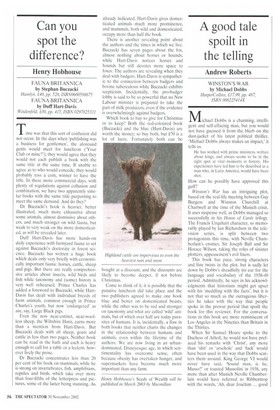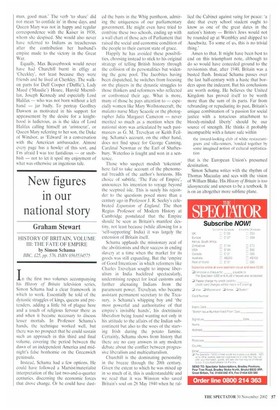A good tale
spoilt in the telling
Andrew Roberts
WINSTON'S WAR by Michael Dobbs HarperCollins, £17.99, pp. 487, ISBN 000225414X Michael Dobbs is a charming, intelligent and self-effacing man, but you would not have guessed it from the blurb on the dust-jacket of his latest political thriller. 'Michael Dobbs always makes an impact,' it tells us.
He has worked with prime ministers, written about kings, and always seems to be in the right spot at vital moments in history. His experiences have led him to be described as a man who, in Latin America, would have been shot.
How can he possibly have approved this guff?
Winston's War has an intriguing plot, based on the real-life meeting between Guy Burgess and Winston Churchill at Chartwell at the time of the Munich crisis. It uses suspense well, as Dobbs managed so successfully in his House of Cards trilogy. The Francis Urquhart character, so memorably played by Ian Richardson in the television series, is split between two protagonists this time, with Neville Chamberlain's cronies, Sir Joseph Ball and Sir Horace Wilson, taking the roles of sinister plotters, appeasement's evil fixers.
This book has pace, strong characters and fine twists in the plot, but is sadly let down by Dobbs's dreadfully tin ear for the language and vocabulary of the 1938-40 period. Admittedly, he says in his acknowledgments that historians might get upset with his 'meddling with the facts', but it is not that so much as the outrageous liberties he takes with the way that people spoke in the prewar period that spoilt the book for this reviewer. For the conversations in this book are more reminiscent of Los Angeles in the Nineties than Britain in the Thirties.
When Sir Samuel Hoare spoke to the Duchess of Atholl, he would not have prefaced his remarks with 'Christ', any more than 'shit' or `arsehole' and 'fuck' would have been used in the way that Dobbs scatters them around. King George VI would never have said, 'Sound man, is he, Musso?' or toasted Mussolini in 1938, any more than after Munich Neville Chamberlain would have referred to Ribbentrop with the words, 'Ah, dear Joachim ... good man, good man.' The verb 'to share' did not mean 'to confide in' in those days, and Queen Mary was not in happy and regular correspondence with the Kaiser in 1938, whom she despised. She would also never have referred to Indians as treacherous after the contribution her husband's empire made to the victory in the Great War.
Equally, Max Beaverbrook would never have had Churchill burnt in effigy at 'Checkley', not least because they were friends and he lived at Cherkley. The walkon parts for Duff Cooper (Duffie'), Lady Maud (`Maudie') Hoare, Harold Macmillan, Joseph Kennedy and especially Lord Halifax — who was not born without a left hand — jar badly. To portray Geoffrey Dawson as motivated in his support for appeasement by the desire for a knighthood is ludicrous, as is the idea of Lord Halifax calling himself an 'aristocrat', or Queen Mary referring to her son, the Duke of Windsor, as 'Edward' in a conversation with the American ambassador. Almost every page has a howler of this sort, and I'm afraid I was too fastidious — or snobbish — not to let it spoil my enjoyment of what was otherwise an ingenious tale.



























































































 Previous page
Previous page